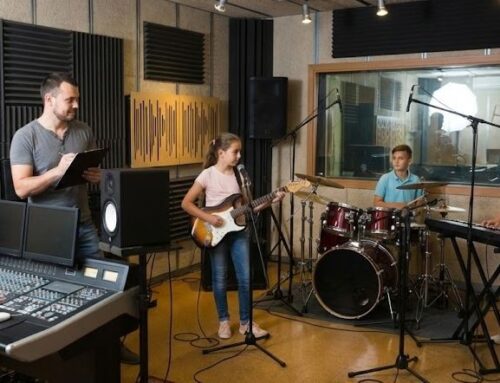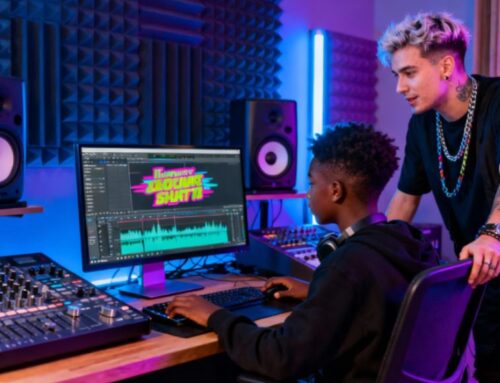Learning to play a musical instrument or improving your vocal skills is a journey filled with excitement, challenges, and immense rewards. However, staying motivated throughout your music lessons can sometimes be a daunting task. Whether you’re a beginner or have been playing for years, finding and maintaining your rhythm is key to your success and enjoyment in music. This article will explore various strategies to help you stay motivated and make the most of your music education journey.
Understanding the Motivation Behind Music
Before diving into specific strategies, it’s essential to understand what motivates you to pursue music. Motivation can stem from various sources:
- Personal Fulfillment: The joy of creating music and expressing yourself artistically.
- Skill Development: The desire to master an instrument or improve your vocal abilities.
- Performance Opportunities: The excitement of performing in front of an audience.
- Social Connections: The friendships and bonds formed with fellow musicians.
- Therapeutic Benefits: The mental and emotional benefits of playing music.
Understanding your primary motivators can help you tailor your approach to music lessons and keep you focused on your goals. If you want to play, then you can find that motivation.
At Capstone Music Burlington, we focus on “playing” versus “practicing”. It’s a frame of mind regardless if you aspire to be a concert pianist, or a shower singer! If you have choose to want to learn music, you’ll do it. Inspiring teacher-musicians, fantastic music learning facility and the love of music is what we’re about. Join us!
Setting Clear and Achievable Goals
Setting specific, measurable, achievable, relevant, and time-bound (SMART) goals is a powerful way to stay motivated. Here’s how you can apply this to your music lessons:
- Specific: Define exactly what you want to achieve. Instead of saying, “I want to get better at guitar,” specify, “I want to learn and master the solo in ‘Stairway to Heaven.'”
- Measurable: Establish criteria for measuring your progress. This could be the number of practice hours, the number of pieces mastered, or improvements in technique.
- Achievable: Set realistic goals that challenge you but are still within reach. If you’re a beginner, aim to learn a new chord each week rather than an entire song.
- Relevant: Ensure your goals align with your broader aspirations in music. If you aim to join a jazz band, focus on jazz scales and improvisation techniques.
- Time-bound: Set a deadline for your goals. This creates a sense of urgency and helps you stay on track.
By breaking down your musical aspirations into smaller, manageable goals, you’ll experience a sense of accomplishment that fuels your motivation.
Creating a Consistent Play Routine
Consistency is crucial in music education. Establishing a regular rehearsal routine helps reinforce learning and builds muscle memory. Here are some tips for creating an effective play schedule:
- Set a Fixed Time: Dedicate a specific time each day for rehearsing. Consistency helps build a habit.
- Create a Rehearsal Space: Designate a quiet, comfortable space for play where you can focus without distractions.
- Warm-Up Exercises: Start each session with warm-up exercises to prepare your fingers, voice, or body for more intensive rehearsal.
- Divide Your Rehearsal: Break your rehearsal session into segments focusing on different aspects, such as scales, technique, sight-reading, and repertoire.
- Use a Timer: Set a timer for each segment to ensure balanced rehearsal and avoid burnout.
- Record Your Rehearsal: Recording yourself can provide valuable feedback and highlight areas for improvement.
Remember, the quality of rehearsal is more important than the quantity. Focused, mindful rehearsing yields better results than mindlessly going through the motions.
Embracing Variety in Play
Monotony can quickly lead to a loss of motivation. Keeping your rehearsal sessions varied and engaging can make a significant difference. Here are some ideas to add variety:
- Learn New Pieces: Regularly introduce new pieces to your repertoire to keep things fresh and exciting.
- Experiment with Genres: Explore different musical genres to broaden your skills and discover new interests.
- Use Technology: Incorporate music apps, online tutorials, and backing tracks to enhance your rehearsal.
- Join a Group: Playing with others in a band, orchestra, or choir can provide new challenges and social interaction.
- Improvise: Spend some time improvising and experimenting with your instrument. This can boost creativity and enjoyment.
- Set Challenges: Challenge yourself with technical exercises, speed drills, or by playing complex pieces.
By keeping your rehearsal sessions dynamic, you’ll maintain interest and motivation.
Seeking Inspiration from Others
Inspiration can come from various sources, including other musicians, teachers, and performances. Here are some ways to seek inspiration:
- Attend Live Performances: Watching live performances can reignite your passion for music and provide new ideas.
- Follow Musicians: Follow your favorite musicians on social media, watch their interviews, and learn from their experiences.
- Join Music Communities: Engage with online forums, attend workshops, and participate in music camps to connect with like-minded individuals.
- Learn from Peers: Collaborate with fellow students, share progress, and offer mutual support.
- Study Music History: Understanding the history and context of the music you’re learning can deepen your appreciation and motivation.
Being part of a community and drawing inspiration from others can provide a sense of belonging and purpose in your musical journey.
Overcoming Challenges and Setbacks
Every musician faces challenges and setbacks. The key to staying motivated is learning how to overcome them:
- Stay Positive: Maintain a positive attitude and remind yourself that setbacks are a natural part of the learning process.
- Break Down Difficult Passages: Tackle challenging sections of music by breaking them down into smaller, manageable parts.
- Seek Help: Don’t hesitate to ask your teacher or peers for guidance and support when you encounter difficulties.
- Reflect on Progress: Regularly reflect on how far you’ve come and celebrate your achievements, no matter how small.
- Stay Patient: Understand that mastering an instrument takes time and effort. Be patient with yourself and enjoy the journey.
Resilience and perseverance are essential traits for any musician. Embrace challenges as opportunities for growth and learning.
Maintaining a Healthy Balance
Balancing music lessons with other aspects of life is crucial for sustained motivation. Here are some tips for maintaining a healthy balance:
- Manage Time Wisely: Use a planner or calendar to allocate time for rehearsal, school/work, and leisure activities.
- Set Priorities: Determine your priorities and allocate time accordingly. It’s okay to adjust your rehearsal schedule during busy periods.
- Take Breaks: Regular breaks during rehearsal sessions can prevent burnout and keep you refreshed.
- Stay Physically Active: Physical exercise can improve your overall well-being and indirectly benefit your musical performance.
- Enjoy Other Hobbies: Engage in other hobbies and interests to keep your life balanced and enriching.
A balanced approach ensures that you remain motivated and enjoy your music lessons without feeling overwhelmed.
Celebrating Your Musical Journey
Finally, it’s important to celebrate your musical journey and acknowledge your progress. Here are some ways to celebrate:
- Perform Regularly: Whether it’s a formal recital or an informal gathering, performing for others can be highly rewarding.
- Record Your Progress: Create recordings of your performances to track your improvement over time.
- Share with Others: Share your music with friends, family, and online communities to receive feedback and encouragement.
- Reward Yourself: Set up a reward system for achieving your goals, such as treating yourself to new music gear or attending a concert.
- Reflect on Your Journey: Take time to reflect on your musical journey, the challenges you’ve overcome, and the milestones you’ve reached.
Celebrating your achievements reinforces the joy and satisfaction of making music, keeping you motivated for the future.
Keep Your Rhythm and Let the Music Play On
Staying motivated in music lessons requires a combination of clear goals, consistent playing, variety, inspiration, resilience, balance, and celebration. By implementing these strategies, you can maintain your enthusiasm and continue to grow as a musician. Remember, the journey of learning music is as important as the destination. Embrace the process, enjoy the moments of discovery, and let your passion for music guide you.
Your musical journey is unique, and staying motivated is a personal endeavor. Find what works best for you, and don’t be afraid to experiment with different approaches. With dedication and the right mindset, you can achieve your musical goals and experience the profound joy that music brings. Keep finding your rhythm and let the music play on!






